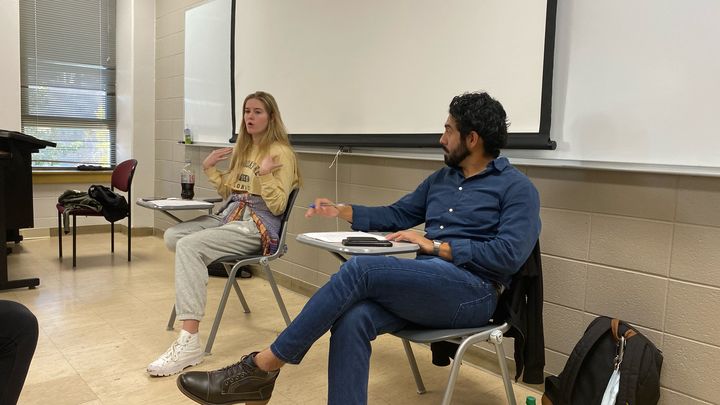
Help me pay guest speakers for my prison class
Donation protected

As you may know, I have been teaching a composition course at Georgia State themed on mass incarceration, and near the end, I invite prison survivors to come to my class and speak about their experience with the prison industrial complex. This gives students on the outside a chance to sit in the same room as someone society has taught them to dismiss, and the impact has been astounding.
But here’s the problem:
I treat these folks to meals when they come speak (out of my own pocket), but they need so much more than meals. It’s almost an insult, that they come to my classes, relive their traumas at the expense of their mental health, so that my students can learn something true about humans and human potential, along with the disaster that is our prison system. When it’s over, the guests must return to their lives, which have been disenfranchised in every way possible. They struggle to pay rent. They can’t afford a car, which limits what kinds of work they can do. They need money, not meals. Many of them have these struggles on top of trying to finish their college degrees.
But as Levar Burton liked to say, “Don’t take my word for it.” Here is what my friend L., someone currently finishing the end of her sentence at a transitional center, recently wrote to me when I sent my latest call for guest speakers:
“Speaking to your class last Spring was awesome and I'd love to do it again, but want to give priority to some of my comrades who haven't yet had the chance.
I also strongly believe we should be compensated by the school for this, via stipend or honorarium. That was my concern last time and it remains concerning. You coming out of pocket to feed us is multipliciously problematic. What we need, and appreciate!, from you is continued solidarity. But we also want social equity and financial independence, and the right to be paid for speaking engagements like everyone else -- by institutions like GSU, which have the $$ and supposedly care about "social justice" issues.
Each person you copied here has knowledge and expertise of the criminal system that will benefit GSU students in a way nothing else in their curriculum will. I'm glad you recognize this, but GSU administrators need to understand it. They pay other experts to speak; so let them put their money where their mouth is and pay us, too.”
I have pursued the university for funding, but was denied. I will keep trying, but I will not be able to get that funding in time to pay the guests this semester. Will you please consider contributing to rewarding these speakers for their tremendous work with my students?
If that doesn’t lay out the case enough, here are some reflections from my students on the outside wrote about meeting these phenomenal prison survivors:
“While listening to all the guest speakers, I was genuinely amazed by each of their inspiring stories. … I had many misconceptions about prison, and just hearing each of their stories made me “woke” to a problem that has always been here and needs to be changed.”
“A lot of the things we discussed in class can be tied to what the speakers said, for example, on how we talked about violence and [Danielle] Sered’s ideals; there does tend to be a lot of violence within the prison systems, which tends to be overlooked... They all inspired me to keep doing good, stay in school, and always consider how my actions today can affect everything I do in the future. I love how these talks opened up discussions for things that really matter, that is not talked about in school systems.”
“[The Guest Speakers] both inspired me to keep pushing no matter what. That no matter
your situation, you can still achieve goals, especially in education.”
“It still baffles me how energetic and positive all of our speakers remained after having been through so much. J’s story made me think a lot about what we read, specifically Chapter 5 of Until We Reckon. In this chapter, there is a section called “Reshaping the Power of the U.S. Prosecutors,” which talks about how much prosecutors benefit from our current system. If mass incarceration was reduced, then prosecutors would have to use prison as a last resort rather than the main way of punishment. This part was very important because J. explained how she had no intention of committing a crime, yet was sentenced very harshly. The message each speaker left with did inspire me. [Each of them] had their own unique lessons, which I appreciated. All of the pieces of advice left made me think about my future and reflect on my personal life. What does God have in store for me? Will I achieve all of my dreams? Will I have the typical “American dream” lifestyle or stray significantly far away from that? These are the kinds of questions I asked myself last week and reflected upon more.”
Even five dollars would be amazing.
Thank you for your time in reading and considering this.
With all my heart,
Nora
Organizer
Nora Bonner
Organizer
Decatur, GA